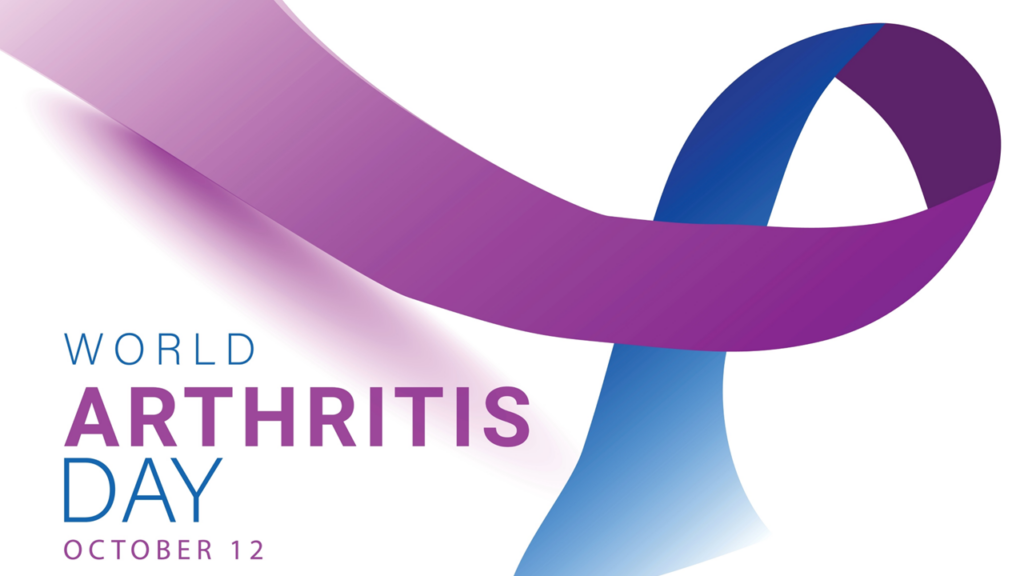Arthritis affects millions globally, limiting daily activities and causing pain. Data from 2019 to 2021 show arthritis affects 53.2 million adults in the US, with women more impacted than men. World Arthritis Day 2024 brings attention to this widespread condition under the theme, “Informed Choices, Better Outcomes.” The focus is on empowering patients and healthcare professionals through evidence-based information to improve the quality of care.
Leading organizations like the European Alliance of Associations for Rheumatology (EULAR), the Arthritis Foundation and the International Foundation for Autoimmune & Autoinflammatory Arthritis (AiArthritis) spearhead rheumatoid arthritis awareness events and more, encouraging participants to wear blue in solidarity.
In addition, recent clinical research and new therapeutic approvals bring promising advances in managing rheumatic and musculoskeletal diseases (RMDs).
World Arthritis Day 2024 Theme: Informed Choices, Better Outcomes
EULAR’s theme for World Arthritis Day 2024, “Informed Choices, Better Outcomes” highlights the importance of tailored strategies in arthritis management. With the growing number of treatment options, informed decisions are essential.
Ongoing research provides insights into disease mechanisms, treatment efficacy and patient outcomes, enabling healthcare providers to guide patients more effectively.
XTALKS WEBINAR: Improving Clinical Trial Diversity: Meeting Patients Where They Are
Live and On-Demand: Friday, November 15, 2024, at 11am EST (4pm GMT/UK)
Register for this free webinar to discover how organizations can contribute to improving clinical trial diversity and ultimately leading to better health outcomes for everyone.
Latest Developments in Arthritis Clinical Trials and Research
UCB’s BE BOLD Phase IIIb Trial for Psoriatic Arthritis
UCB has initiated the BE BOLD Phase IIIb trial, aiming to directly compare Bimzelx (bimekizumab) to Skyrizi (risankizumab) for adults with active psoriatic arthritis. This multicenter, randomized, double-blind study will enroll around 550 participants, focusing on biologic treatment-naïve patients or those with an inadequate response to tumor necrosis factor inhibitors. The primary endpoint targets a 50 percent improvement in psoriatic arthritis symptoms (American College of Rheumatology 50 [ACR50]) at Week 16. Top-line results are anticipated in 2026.
DeepCure’s Selective BRD4 (BD2) Inhibitor, DC-9476
DeepCure’s selective bromodomain-containing protein 4 (BRD4) inhibitor, DC-9476, has shown potential for rheumatoid arthritis. Preclinical studies revealed that DC-9476 significantly reduced interleukin-6 (IL-6) production in human macrophage-like cells and demonstrated an over 80 percent reduction in disease scores in the collagen antibody-induced arthritis (CAIA) mouse model, outperforming etanercept’s (Enbrel) 47 percent reduction. DC-9476 also showed no toxicity, making it a potential candidate as a novel oral monotherapy.
Citryll’s Collaboration on NET Research for Rheumatoid Arthritis
Citryll, in partnership with leading rheumatology centers in the Netherlands, is advancing research on neutrophil extracellular traps (NETs) in rheumatoid arthritis through the Signs Of the Nature of NETosis in Rheumatoid Arthritis (SONNET) project. Funded by the Dutch Arthritis Society (ReumaNederland), this research aims to explore the link between NET biology and rheumatoid arthritis progression. Citryll’s lead candidate, CIT-013, enhances the clearance of existing NETs and inhibits new formation, representing a novel therapeutic approach.
New Biosimilars in Arthritis Treatment
Teva and Alvotech’s Selarsdi, a New Ustekinumab Biosimilar
Teva Pharmaceuticals and Alvotech received US Food and Drug Administration (FDA) approval for Selarsdi (ustekinumab-aekn), a biosimilar to Stelara, for treating moderate to severe plaque psoriasis and active psoriatic arthritis in both adults and children.
Expected to launch in the US by February 2025, Selarsdi underwent extensive clinical evaluation, demonstrating equivalent efficacy, safety and immunogenicity to its reference product. Its approval could support the expanding biosimilars market.
Teva and Alvotech Introduce Simlandi, a High-Concentration Adalimumab Biosimilar
The launch of Simlandi (adalimumab-ryvk) introduced the first high-concentration, citrate-free biosimilar to Humira with interchangeability status. It met the market need for rheumatoid arthritis, psoriatic arthritis and Crohn’s disease treatments, forming part of Teva and Alvotech’s strategy to expand cost-effective options in the US healthcare system.
Biosimilars like Simlandi reinforce the importance of informed choices in achieving better health outcomes for those affected by arthritis.
Innovative Treatment Delivery
Mallinckrodt’s Acthar Gel SelfJect Injector: Arthritis Foundation Certified
Mallinckrodt recently introduced the Acthar Gel SelfJect injector, receiving the Arthritis Foundation’s Ease of Use certification. This recognition reflects the device’s patient-friendly design, making it easier for individuals with arthritis to self-administer their medication.
Supported by findings from nine human factors studies, the SelfJect injector aims to improve the administration experience for patients and caregivers, aligning with efforts to modernize treatment options and empower patient choices.
Digital Health Technologies in Rheumatoid Arthritis Management
Advancements in digital health technologies provide new ways to remotely assess rheumatoid arthritis severity.
A 2024 study used smartphones and wearables to monitor rheumatoid arthritis patients’ physical function and mobility. Data from guided iPhone tests and sensor readings helped distinguish rheumatoid arthritis patients from healthy controls, improving severity assessment when combined with traditional outcomes. These digital tools could enable real-time insights for more personalized care.
As we continue to embrace more innovative treatments and venture into novel research, healthcare providers will have the opportunity to be better equipped to guide arthritis patients toward informed choices that lead to improved outcomes.












Join or login to leave a comment
JOIN LOGIN